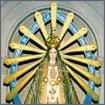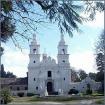Argentina
The Catholic Church is the state church of Argentina, (and of six other Latin American countries, as well: Bolivia, Colombia, Costa Rica, the Dominican Republic, Haiti and Paraguay). While guaranteeing freedom of religion, Argentina's Constitution (as updated in 2008) also asserts that the state supports the Roman Catholic faith (I.2) and that both president and vicepresident must be Roman Catholics (2.76). In addition to many institutional privileges, Argentina also provides the Catholic Church with a variety of subsidies, including clerical salaries, which are not available to other religious groups. As in Germany, these perpetual payments to the Church are justified as compensation for expropriation of Church property carried out two centuries ago.
The enduring power of the Catholic Church in the homeland of Pope Francis was demonstrated in 2018. Although botched illegal abortions are the single leading cause of maternal deaths in Argentina, the Church campaigned hard to uphold the strict abortion laws –and ultimately won. The Clarín daily newspaper reported that Francis had asked anti-abortion legislators to pressure fellow lawmakers to reject the bill. And while the senators debated it, the Archbishop who had succeeded Francis held a "Mass for Life" in the cathedral a few blocks away.
The senate's refusal to liberalise abortion prompted hundreds of demonstrators to protest against Church interference and for separation of church and state. However, this would mean changing the country's Constitution whose second article states that the government "supports the Roman Catholic religion".
 |
The chaplains and the “death flights” |
Argentina's military concordats created state-funded chaplaincies which helped consolidate the power of the dictatorship. New evidence has come to light about the chaplains' role during the Argentine junta's reign of terror from 1976 to 1983. Chaplains in the police and the military reassured those who were haunted by the screams of the people they abducted, tortured and murdered — and helped them carry on. | |
 |
Concordat's Military Bishop shocks Argentina, President threatens to end Vatican pact |
In 2005 the Argentine military bishop attacked AIDS prevention by the democratic government, while appearing to make light of the death squads of the former military junta. This revealing remark has made it politically possible for President Nestor Kirchner to threaten to cancel a concordat — the “international treaty” which let the Vatican appoint this military bishop — although it is the taxpayers who provide the bishop’s salary. | |
 |
Military concordat (1957) and update (1992) |
This concordat established a military chaplaincy which helped to consolidate Church influence in the military government after the 1955 coup. It also entrenched the junta by helping to create a closed confessional loop. Military chaplains were given jurisdiction over everyone connected with the military, which really meant everyone likely to have reliable information about the military policy of abduction, torture and murder during the 1976–1983 “Dirty War”. This removed the danger of military personnel confessing their sins to outside priests. | |
 |
Concordat with General Ongan�a (1966) |
On 29 June 1966 General Juan Carlos Onganía ditched democracy, on 29 July he had the police terrorise the University of Buenos Aires and on 10 October he gave Argentina this concordat. Paul VI hailed this pact with a military dictator as “the first fruit in the field of Church-state relations of the Ecumenical Council Vatican II.”* This concordat needed no separate ratification. |














